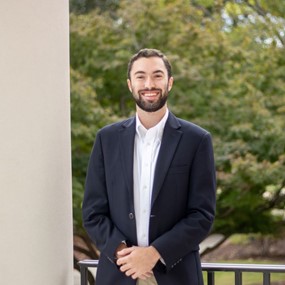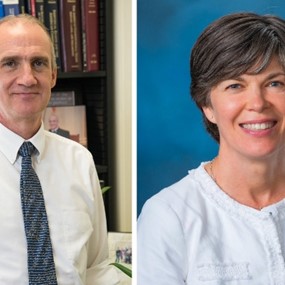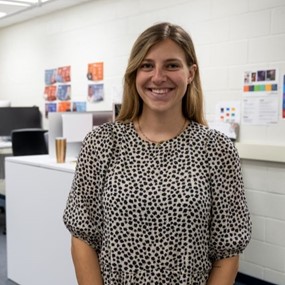Auburn University class creates resiliency plan for Camp Hill to build for a better future after severe storms
The hailstorm devastated Camp Hill.
Blue tarps cover the roofs of historic homes, and cars line the streets, most of them totaled or dented with shattered windshields from the hail that fell in March 2023.
Abigail Murphy, a reporter for The Alexander City Outlook, covered the damage. She said it was a critical blow for a community already facing housing and transportation problems.
"They didn't get the FEMA grant or the disaster declaration they were hoping for, so that obviously set a lot of barriers that originally they were hoping weren't going to be there," Murphy said. "They did get public assistance, so all the government buildings are slowly getting repaired, but the individual homes aren't, and that's where a lot of the big challenges and needs came."
Everything that came in contact with the hail, it was severely damaged. In a town like Camp Hill, a lot of people didn't have adequate insurance.
~ William Hart, Homeowner
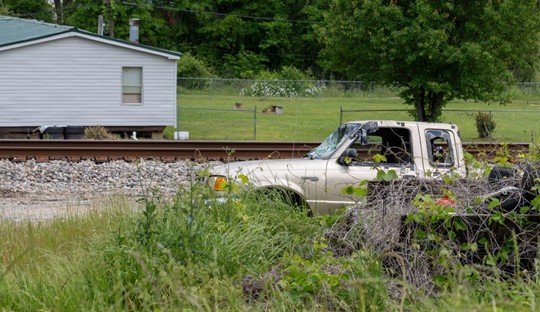
Many of the family homes in Camp Hill are heirs' property, meaning that the houses and land have been passed from generation to generation. But without the proper paper trail, those residents can't prove they own the property and claim disaster relief.
Like many residents, homeowner William Hart has loved the town of Camp Hill his entire life. His home took significant damage, but outside assistance was scarce.
"The roof, just about everything around it, outbuildings, everything that came in contact with the hail, it was severely damaged," Hart said. "In a town like Camp Hill, a lot of people didn't have adequate insurance, didn't have the right contacts to make contact with people that could actually come in and give help and do things of that nature. I don't know exactly how much hands-on help was there right after the storm itself."
Local and nonprofit organizations helped Camp Hill survive the storm, but when it was time to build for a better future, they called on Auburn University.
SERVING OUR STATE: Explore communities across Alabama supported by the work of Auburn MCP students.
Master of Community Planning Program Director Megan Heim LaFrombois’ Synthesis Studio class sends students into a real community to develop real solutions.
"In the case of Camp Hill, they were recovering from the storm a year ago. They're finally starting to move out of this emergency response mode and think big picture. That's where we came in," Heim LaFrombois said. "A lot of the traditional textbook things didn't apply, given the uniqueness of Camp Hill, so it was really an interesting opportunity for students to get creative, be innovative, think how that could work here, how it wouldn't work and come up with some new ideas for them."
A lot of the traditional textbook things didn't apply, given the uniqueness of Camp Hill, so it was really an interesting opportunity for students to get creative.
~ Megan Heim LaFrombois - MCP Program Director
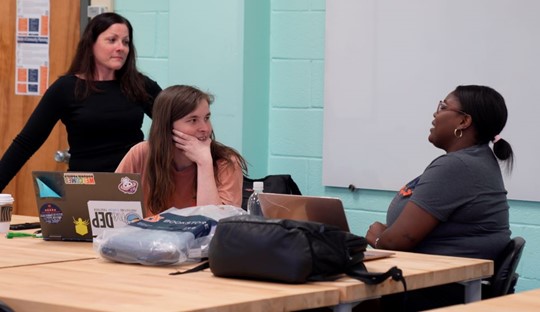
The class focused its community resilience plan on three major themes: downtown revitalization, housing and economic development.
Through a series of community events, students including Karington Allen worked to translate what the community wanted and needed into an actionable way forward.
"Knowing where to start is always a challenge at first because you see a community that you want to help, but it's not about your vision. It's about their vision," Allen said. "Camp Hill is just a community of people that are so full of love. So, it was really cool to kind of figure out what we love and how that aligns with what they love and try to combine those things so that we could really give them something great."
One of the major areas of focus was Camp Hill’s downtown. The area used to host a pharmacy and hotel near the railroad, but time and the elements have worn down the sidewalks, buildings and businesses.
Riley Dibble, another community planning student, and Allen focused on downtown revitalization to create a more sustainable space for the community to gather.
"Downtown was where Camp Hill used to flourish. It's what it grew up around," Dibble said. "Camp Hill is trying to preserve that character because we have long-term residents who remember what it used to be like. That's what a lot of the driving force is, trying to bring back what Camp Hill used to be, and also bring in the new ideas that are there as well."
The downtown revitalization plans include conserving cultural heritage sites, hosting public art and festivals, repairing sidewalks, adding bike lanes and green space, adapting existing spaces for new businesses and updating buildings to withstand severe weather.
Students also proposed economic development solutions that included opening a Camp Hill grocery store, increasing professional development and entrepreneurial resources, launching more transportation options, creating retail jobs and building health/wellness programs.
For residents struggling with housing, students made plans to build a community center that can be used as a storm shelter, develop new and existing housing to be more accessible and connect residents with organizations that specialize in acquiring legal titles for heirs' property.
Heirs' property includes land or houses that have been passed down from generation to generation. Without the proper paper trial, many Camp Hill residents couldn't claim disaster relief for their homes. Auburn students connected those residents with organizations that specialize in resolving heirs' property issues.
For each solution proposed, students also provided funding sources that will help Camp Hill make the plan a reality.
"With Camp Hill particularly, we wanted to make sure that they had something that they could use in the end," Heim LaFrombois said. "When we think about resiliency, how we conceptualize in this class is really all encompassing. It's certainly the environmental effects, but it's also economy, it's housing, it's all that infrastructure with the capacity to withstand if a crisis hits, to adapt, to rebuild, to come back better and stronger."
Kathleen Kirkpatrick is an environmental engineer and senior associate with The Capacity Collaborative, which develops a community's ability to navigate social and environmental challenges with resilience.
Kirkpatrick assisted Auburn students and the Camp Hill community with developing their plan and said the result should serve as a model for other small, rural communities.
"Having an objective new viewpoint that's really been trained about what it takes for a community to be successful is really valuable," Kirkpatrick said. "It's exciting and it's hopeful. The students have done a great job of really cataloging potential resources, but it's up to the community now to choose which pieces they really want to run with. As someone who facilitates building capacity and helping communities strategically think about the future, they've got a great menu of options to work with that these students have pulled together."
With Auburn's community resilience plan, Camp Hill can get the disaster relief it needs, better care for its elderly residents, restore the beauty of its downtown, elevate residents out of poverty and more.
The plan directly supports local organizations such as the Alabama Center for Rural Organizing and Systemic Solutions (ACROSS). Executive Director Warren Tidwell said Camp Hill residents have rallied around what the Auburn class created.
"What the students did is brought this amazing energy in, care for the issues and the brilliance that they each have as individuals to help us," Tidwell said. "I see a dramatically increased quality of life here. But now we've got a roadmap, and I think that it's definitely going to change things for the better because I believe in the people here. Without the people, the plan means nothing. And we have the people."
I see a dramatically increased quality of life here. We've got a roadmap...and we have the people.
~ Warren Tidwell - Executive Director, ACROSS

William Hart, the Camp Hill homeowner who witnessed the hailstorm damage on his own property, is one of those people. He's seen Camp Hill change over the last 66 years and said he's excited to see what comes next, thanks to the work of Auburn students.
"We've always talked about it, but there are a lot of people here that really would love to see this town grow and would like to put some energy into it," Hart said. "Personally, I think that the fact that the town may have an opportunity to be revitalized and can be made into something that we all take pride in and stand behind means a lot."
Find more information about the Master of Community Planning program.
Tags: Political Science Community, Outreach and Engagement Students




